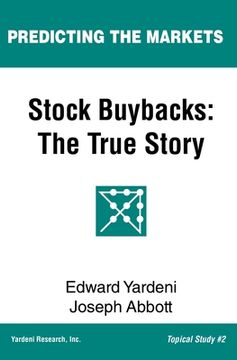Reseña del libro "Stock Buybacks: The True Story (en Inglés)"
Several Progressive politicians have pounced on corporate share buybacks lately. They see buybacks as a major source of income and wealth inequality, subpar capital spending, and lackluster productivity. In their opinion, buybacks have contributed greatly to the stagnation of the standards of living of most Americans in recent years. So they want to limit buybacks or even ban them.Some of Wall Street's stock-market bears have been growling about buybacks as well. They've been arguing that buybacks have rigged the stock market in favor of the bulls. They claim that companies buy back their stock to boost their share prices, using debt to finance this dubious activity. As a result, corporate balance sheets have become increasingly leveraged, which makes them vulnerable to a recession. Widespread corporate leverage, in turn, would exacerbate any economic downturn. The bears therefore remain bearish and expect to be vindicated with a vengeance, eventually.In this study, Edward Yardeni and Joseph Abbott show that the facts don't support either narrative. The most common reason that S&P 500 companies buy back their shares is to offset the dilution in the number of shares outstanding that results when employee compensation takes the form of stock options and stock grants that vest over time, not just for top executives but for many employees. In effect, the ultimate source of funds for most stock buybacks is the employee compensation expense item on corporate income statements, not bond issuance as the bears contend.The authors explain that the bull market in stocks has boosted buybacks to a greater extent than buybacks have boosted the market, whereas the opposite is more widely believed. Rising stock prices increase the attractiveness of paying some of employees' compensation with stock grants. Buybacks then are necessary to offset the dilution of earnings per share. While the latest bull market, like previous ones, has been driven by rising earnings, it's a Wall Street legend that earnings per share have been boosted artificially and significantly by stock buybacks. It may seem that way only because what lift buybacks have provided to stock prices is highly visible, occurring in the open market, whereas companies' need to offset stock issuance with stock repurchases is less apparent.The authors also refute Progressives' pervasive narrative that most Americans' standards of living have stagnated in recent decades and that buybacks per se have worsened income inequality.

